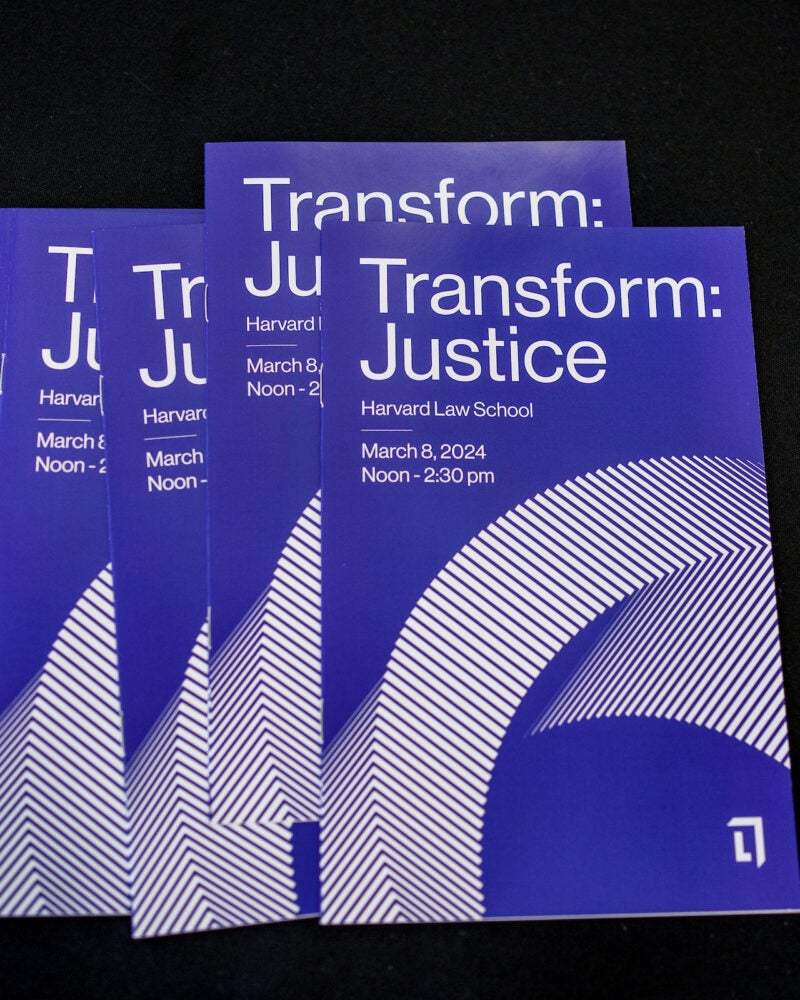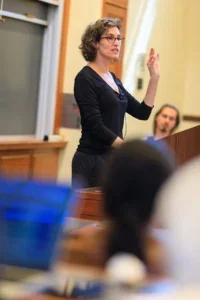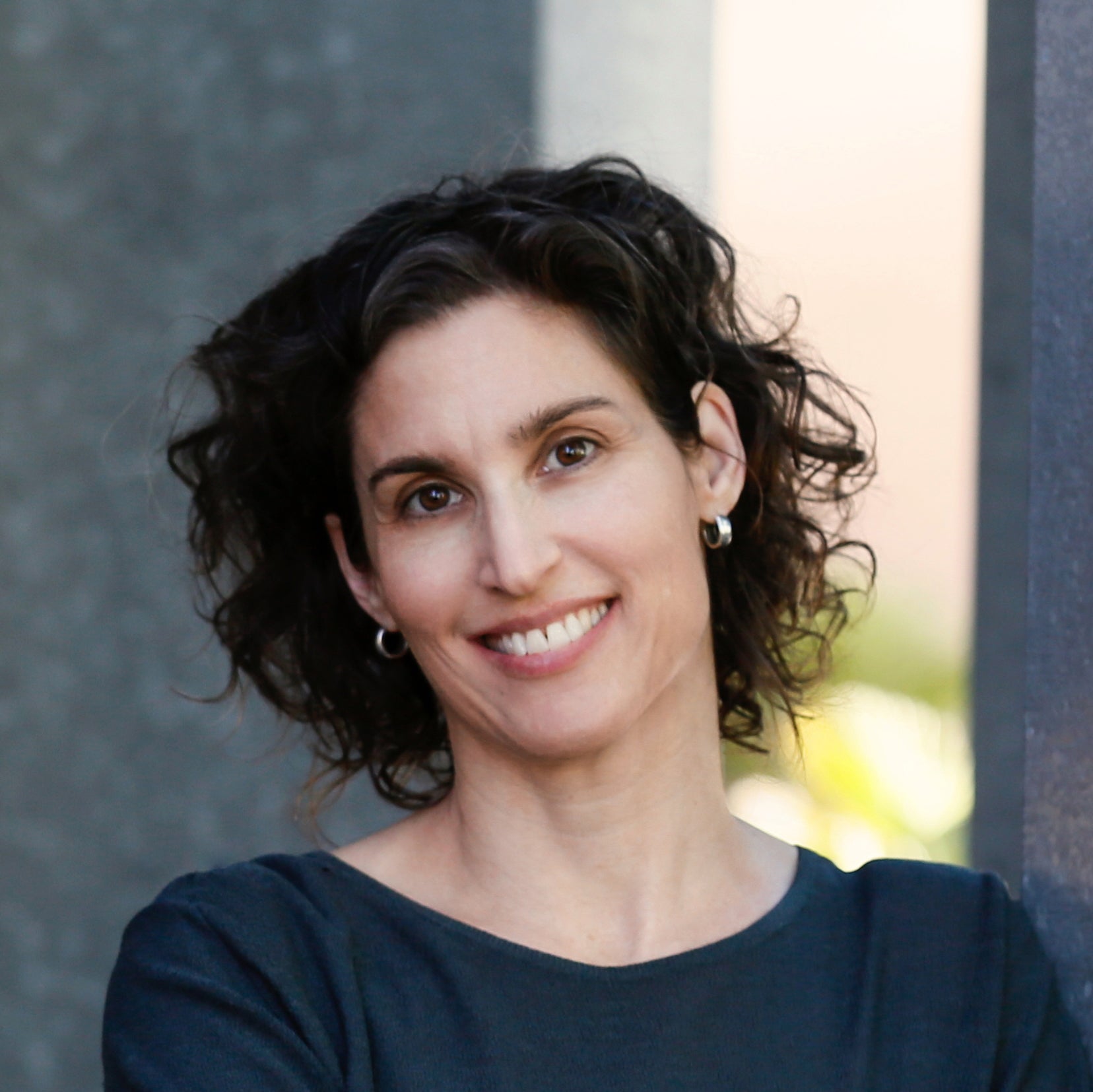People
Alexandra Natapoff
-
On the occasion of her appointment as Lee S. Kreindler Professor of Law, criminal justice expert Alexandra Natapoff delivered a lecture titled "Redistributing Law: A View from Below."
-
‘You can do justice with law; you can also do injustice’
April 14, 2023
In her Last Lecture, Harvard Law Professor Alexandra Natapoff urges graduating students to think hard about the choices they make.
-
An alleged drug trafficker, a detective trying to take him down, and the woman caught in the middle
March 1, 2023
Even before she found herself on the pavement of a Fall River parking lot, wrists zip-tied behind her back, Carly Medeiros knew it was all…
-
Snitching with Alexandra Natapoff
February 9, 2023
What exactly is a snitch, and why is the use of informants so corrosive to criminal justice? This week, Adam is joined by Alexandra Natapoff…
-
‘Falling in love with your rat’: The criminal informant system in the US
November 18, 2022
HLS Alexandra Natapoff argues in her revised book that snitching undermines justice and recommends what we should do about it.
-
Harvard Law School welcomes the LL.M. Class of 2021 to campus
November 2, 2022
Dean John F. Manning ’85 invited members of the LL.M. Class of 2021, whose LL.M. year was entirely virtual, to experience life on campus and connect with each other in person.
-
Who’s Really Cycling In and Out of Cleveland’s Courts? “Career Criminals” Who Aren’t What You Think
October 28, 2022
Deshawn Maines stood in a courtroom inside the Cuyahoga County Justice Center on Nov. 7, 2018, awaiting his sentence. Six months earlier, he had Ubered…
-
Who’s really cycling in and out of Cleveland’s courts?
October 26, 2022
…“A vast number of people who we sweep into the criminal system are not actually ‘criminal’ in any meaningful sense,” said Alexandra Natapoff, a Harvard…
-
Woman’s rape cries go unheard in unmonitored drug sting
September 13, 2022
The Washington Post – A woman outfitted with a tiny microphone and hidden camera walked up to a dilapidated drug house on a chilly afternoon…
-
The Stakes Are High As The Michigan Kidnapping Trial Begins And The Government Is Leaving Nothing To Chance
March 8, 2022
On Tuesday morning, jury selection begins in the long-anticipated trial of four men accused of conspiring to kidnap Michigan Gov. Gretchen Whitmer in the run-up to the 2020 elections. To avoid potential life sentences, the defendants, who argue they were entrapped, will have to overcome a mountain of evidence including hours of their private, often graphic, conversations, as well as testimony from two other defendants in the case who have pleaded guilty and are now cooperating with the investigation. ... BuzzFeed News asked four former federal prosecutors about the use of such statements. None recalled ever having seen one. Harvard Law professor Alexandra Natapoff, among the nation’s preeminent scholars on the use of confidential informants, said she had never heard of informants being asked to sign nondisclosure statements, calling the use of one “interesting.”
-
WATCH: “‘A Necessary Evil’: The Cost of Confidential Informants,” a KSAT 12 Defenders Investigation
February 14, 2022
Nationwide, police agencies and prosecutors agree that the increased use of confidential informants, or ‘CI’s, has been a boon to fighting crime, especially when it comes to drug trafficking. They claim that informants can often go places and pierce certain social and criminal circles that an undercover officer can’t. Why? Because CIs are often known criminals who got ‘caught in the act’ and were offered a deal: Help make cases against others and you can stay out of jail. Using a known criminal in a key position of trust might sound like a ‘dicey’ proposition and in fact, many in law enforcement call CIs ‘a necessary evil’. ... Meet Alexandra Natapoff, a professor of law at Harvard University, a former Federal Public Defender, and widely considered to be the top expert on confidential informants and their impact on our legal system. Her take? “It results in wrongful convictions,” says Natapoff. “It results in often police corruption. It results in the wrong people being charged and convicted or punished for the wrong things.”
-
Though confidential informants are often utilized by law enforcement agencies to produce more arrests, the lack of transparency around the process has long had experts concerned. In most cases, confidential informants are suspects that have been arrested or convicted for crimes of their own, but cut a deal with police and prosecutors to reduce their sentence in exchange for information that leads to a more valuable arrest. ... “Criminal law is highly tolerant of the secrecy and the confidentiality, and therefore the lack of transparency and accountability that goes with that in the use of informants,” said Harvard law professor and criminal justice expert Alexandra Natapoff. In some ways, Natapoff said, Texas has set an example on the issue.
-
Her Son Needed Help. First, He Had to Help the Police.
January 4, 2022
When Troy Howlett collapsed and died in his bedroom in Charles City, Virginia, on the morning of July 30, 2018, his mother, Donna Watson, was on vacation. It was a Monday, and 31-year-old Howlett was starting a new job that day. Watson, knowing her son was nervous about it, kept checking in, growing more worried as she got no response. Later that evening, having run out of reasons why her son wouldn’t or couldn’t call or text back, she asked a friend to look for him. When the friend found her son’s body, he told her it looked like his hands were locked in prayer. ... While Watson has turned to the courts for restitution, she’s also looking to the Virginia state legislature. Some states have adopted legislation to address the problem of unreliability of informants and the wrongful convictions that often result from their misinformation, according to Alexandra Natapoff, a professor at Harvard Law School and author of Snitching: Criminal Informants and the Erosion of American Justice. “But those reforms tended not to address the problem of the use of informants who have substance use disorders,” Natapoff told me, “either from the perspective of innocent people who were convicted on that basis or from the perspective of the vulnerable informants themselves, who were often pressured into becoming informants at risk to themselves or risk to their recovery, or had their addiction worsen in their performance of their jobs.”
-
Misdemeanors ‘Can Haunt A Person For Life’: Why LA’s DA Stopped Charging Many Of Them
December 7, 2021
When Los Angeles District Attorney George Gascón took office a year ago, he directed the county’s nearly 1,000 prosecutors to decline charges involving 13 categories of low-level misdemeanors, including driving on a suspended license, drug and paraphernalia possession, and public intoxication. The sweeping new policy called for misdemeanor charges only when there are extenuating circumstances, like repeat offenses. An LAist review of millions of criminal cases found that the reform, dubbed Special Directive 20-07, has led to a dramatic decline in the rate at which the DA charges misdemeanors. ... Progressive academics and community groups say the changes are necessary to address a bloated and unequal criminal justice system, and that low-level criminal charges affect thousands of Angelenos as well as their families and communities. "The record of the misdemeanor arrest can haunt a person for life,” said Harvard law professor Alexandra Natapoff, the author of the book "Punishment Without Crime: How Our Massive Misdemeanor System Traps the Innocent and Makes America More Unequal." People accused of misdemeanors in California are typically arrested or given a citation. If found guilty, a defendant can face a sentence of up to one year in jail and a fine of $1,000. “It can ruin their credit, it can disable their ability to get a job, or a loan, or housing,” Natapoff said. “There’s a whole world of consequences that far outstrip the seriousness of the underlying offense.”
-
‘Talent is equally distributed; opportunity is not’
November 30, 2021
Future-L, a pilot collaboration between Harvard Law School and the National Education Equity Lab, introduces high-achieving high school students from historically underserved backgrounds to the legal field.
-
Don’t do it, Jackson: Misdemeanor jail would disproportionately affect residents of color
November 17, 2021
Contrary to what local leaders are telling you, building a new 150-bed “misdemeanor jail” is not going to make Jackson safer. In fact, it will make things worse. ... Further support for saying no to proponents of a new misdemeanor jail is found in Harvard Law School Professor Alexandra Natapoff’s recent book “Punishment Without Crime: How Our Massive Misdemeanor System Traps the Innocent and Makes America More Unequal.”
-
12 books that best explain America’s incarceration system, according to criminal justice lawyers
August 31, 2021
"Punishment Without Crime: How Our Massive Misdemeanor System Traps the Innocent and Makes America More Unequal" by Alexandra Natapoff, so beautifully tells the story of what tiny things people get dragged into the system for," says Rahman. This highly technical book looks at how misdemeanors create massive inequalities and drag non-dangerous members of the public into prisons.
-
The Pandemic Prompted Marilyn Mosby To Stop Prosecuting Low-Level Crimes. Will Other DAs Follow?
April 13, 2021
About a year ago, the Baltimore State’s Attorney’s office stopped prosecuting several low-level offenses—minor drug possession, prostitution, and minor traffic offenses—to reduce the flow of people in and out of local jails and slow the spread of COVID-19. In March, State’s Attorney Marilyn Mosby announced she was making the changes permanent. The decision to stay the course, Mosby told The Appeal, was clear...Researchers and advocates have argued for years that more attention needs to be paid to the misdemeanor system, which ensnares millions of people each year but generally gets less public attention than the felony system. Roughly 80 percent of all criminal cases—more than 13 million annually—are misdemeanors, Harvard Law Professor Alexandra Natapoff told The Appeal. “We cannot reduce mass incarceration without reducing the misdemeanor net that sweeps the vast majority of people into the system in the first place,” she said. New declination policies, she added, “are extraordinarily important” to that effort.






